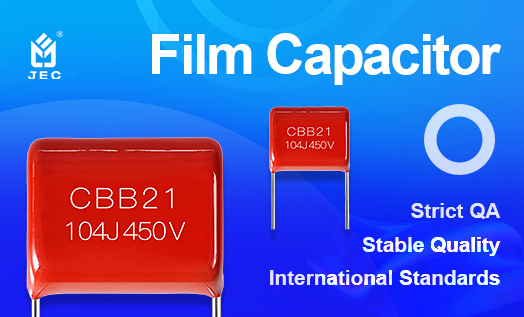Film capacitors, also known as plastic film capacitors, use plastic film as the dielectric, metal foil or metallized film as the electrodes. The most common dielectric materials of film capacitors are polyester films and polypropylene films.
Electrolytic capacitors use metal foil as the positive electrode, the oxide film that is close to the metal with the positive electrode is the dielectric, and the cathode is composed of conductive material, electrolyte (the electrolyte can be liquid or solid) and other materials. Because the electrolyte is the main part of the cathode, so electrolytic capacitor got its name.
Electrolytic capacitors are divided into positive and negative poles, so the positive and negative poles cannot be reversed when installing electrolytic capacitors, otherwise it will cause a short circuit.
Film capacitors and electrolytic capacitors are both capacitors, what are the differences between them?
1. Life time: The working time of electrolytic capacitors is relatively short; while film capacitors can work for a long time as long as there is no problem in quality, which is stronger than that of electrolytic capacitors.
2. Temperature characteristics: The working temperature range of film capacitors is -40°C~+105°C. Film capacitors has good temperature characteristics and can work normally in cold places or hot desert areas; Due to the presence of electrolyte. electrolytic capacitors are likely to solidify in a low temperature environment, reducing the working performance.
3. Frequency characteristics: The capacitance of electrolytic capacitors gradually decreases with the increase of frequency, and the loss increases sharply; while the capacitance of film capacitors only decreases slightly, and the film capacitors do not have much loss when the frequency increases. From this performance point of view film capacitors have low loss and good frequency characteristics.
4.Ability to withstand overvoltage: electrolytic capacitors can only withstand an overvoltage of about 20%. When the overvoltage is higher, the electrolytic capacitors will be damaged; film capacitors can withstand overvoltages higher than 1.5 times the rated voltage in a short period of time.
From the above performance, the performance of film capacitors is better than that of electrolytic capacitors. In some applications, film capacitors are more suitable than electrolytic capacitors. However, whether it is film capacitors or electrolytic capacitors, it is necessary to choose capacitors with guaranteed quality.
Select a reliable manufacturer when purchasing ceramic capacitors can avoid a lot of unnecessary trouble. JYH HSU (or Dongguan Zhixu Electronics) not only has full models of ceramic capacitors with guaranteed quality, but also offers worry-free after-sales. JEC factories has passed ISO9001:2015 quality management system certification; JEC safety capacitors (X capacitors and Y capacitors) and varistors have passed the certification of various countries; JEC ceramic capacitors, film capacitors and super capacitors are in line with low carbon indicators.
Post time: Aug-26-2022

